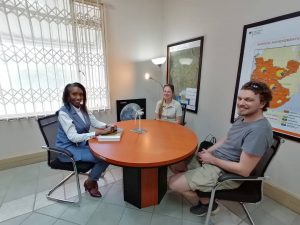
SASSCAL’s Executive Director; Dr Jane Olwoch, Prof Joscha Becker and his PhD student Ms Elisa Toth from the University of Hamburg (Germany)
As we prepare the official launch of the SASSCAL 2.0 research programme in March , 2023, Executive Director Dr. Jane Olwoch received Two Academicians, Prof. Joscha Becker and his PhD student Ms Elisa Toth from the University of Hamburg, Germany on the 19th of January 2023. The two academicians are involved in the SUSTAIN project an initiative that targets sustainable food security in SADC Countries.
The meeting aimed to discuss the way forward with SUSTAIN, an answer to SASSCAL 2.0 ’s Call for SADC GRAND Challenges in integrated research priority areas of Food Security, Water Security and Sustainable Forest and Woodlands.
Sustainable Food Security and Woodland Utilization for Drought Prone Communal Areas under Climate Change (SUSTAIN) consortium is coordinated by the University of Bremen(Germany) with the University of Namibia(Namibia) as the core partners amongst other universities such as Namibia University of Science and Technology(Namibia), University of Eduardo Dos Santos(Angola), University of Botswana, (Botswana), University of Hamburg(Germany), and Botswana University of Agriculture and Natural Resources(Botswana). SUSTAIN aims to achieve restoration and sustainable use of degrading ecosystems in rural community areas by implementing:
- Climate -Smart Conservation Agriculture to increase food security;
- Assist legume tree regeneration for sustainable forests and woodlands;
- Management of “Green Water” to improve water security;
- Soil Restoration;
- Development of plant-protein enriched flours for infants tom combat malnutrition; and
- An Integrated Agricultural Sector assessment to estimate the socio-economic and environmental impact in SADC Countries beyond the experimental sites.
Subsequently SUSTAIN will contribute to the United Nation’s Sustainable Development Goals (SDG) of No Poverty, No Hunger Good Health and Wellbeing , Quality Education, Climate Action, Life on Land, Gender Equality and Partnerships for the Goals.
Under the current food insecurity as a result of Climate Change and other anthropogenic factors, SUSTAIN is a practical example of how research can be turned into action, says Dr Jane Olwoch.
Supporting partners are the Republic of Namibia; Ministry of Agriculture, Water and Land Reform, Deutsche Gesellschaft für Internationale Zusammenarbeit (GIZ)GmbH, International Maize and Wheat Improvement Center (CIMMYT),Germany and EGERTON University, Kenya.
SUSTAIN is in motion and SASSCAL envisions a successful implementation with its various consortiums and partners.




